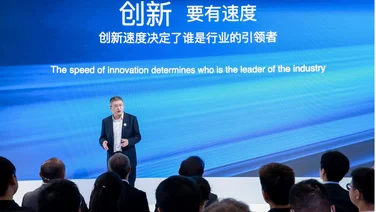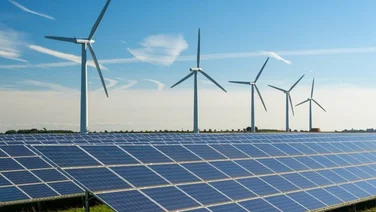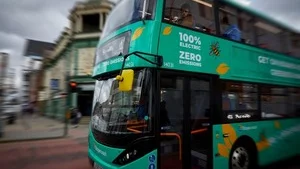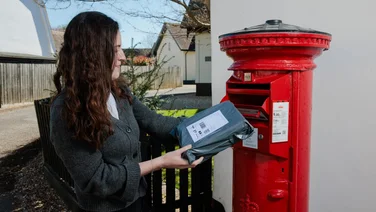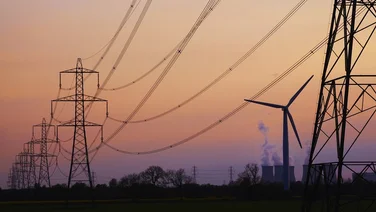- Evan Davis has hosted 20 episodes of the Happy Heat Pump Podcast
- The BBC were concerned over potential accusations of political bias
- Widespread adoption of heat pumps is critical to the energy transition

BBC Radio 4’s PM presenter Evan Davis has been told by the BBC that he is no longer allowed to host the Happy Heat Pump Podcast.
According to Davis, the public service broadcaster was concerned that he risked accusations of political bias and that discussing the technology could be “treading on areas of public controversy”.
Launched with the BBC’s consent in December 2024, The Happy Heat Pump Podcast was a passion project run by Davis and co-host Bean Beanland of the Heat Pump Federation.
It ran for 20 episodes and covered everything heat pump related, including the technology, installation process, costs, and even non-heat pump alternatives for those looking to replace their gas boilers.
Although Davis is an employee of the BBC, the podcast was not produced by the BBC, nor was it distributed through any BBC channels. Neither Evans or his co-host Beanland were paid for their contributions.
Davis said during the introduction of the final episode: “It’s a difficult decision, they [the BBC] are very unkeen to stop me doing things that I find rewarding.”
He believed the decision to prevent him continuing the podcast was due to the heat pump’s link with NetZero.
Watch the final episode below:
Political consensus
Heat pump installations are of paramount importance when it comes to achieving the government’s net zero emissions by 2050 target.
Until very recently, there was political consensus from the main political parties about the important role they had to play in the UK’s energy transition away from fossil fuels.
The Boiler Upgrade Scheme (BUS) was introduced by Boris Johnson’s government in May 2022, offering homeowners and businesses a £5000 grant towards the replacement of fossil fuel heating systems with heat pumps.
The grant was later increased to £7500 under Rishi Sunak, and the rate of heat pump installations had started to accelerate since. According to the MCS, there were 60,000 certified heat pump installations in 2024, so there is still some way to go to reach the government’s target of 600,00 heat pump installations a year by 2030
In March 2025 however, Conservative leader, Kemi Badenoch, dropped her support for net zero, describing the targets as ‘impossible‘. Whether she remains leader long enough to effect long-term policy remains to be seen.
However, she will have been influenced by Nigel Farage and Richard Tice’s Reform party, which is openly hostile to net zero policies. With Reform set to do well in local elections in the UK on May 1st, this makes the political consensus in favour of heat pumps far less straightforward.

Get a free heat pump quote
Answer a few quick questions, and our trusted installers will send you a bespoke heat pump quote – for free.
Reaction
Davis’s co-presenter, and guest on The Eco Experts Postive Energy Podcast, Bean Beanland, of the Heat Pump Federation called the decision stop Davis from participating “quite extraordinary”.
Expressing his disappointment at the move, Beanland told The Eco Experts:
“The outpouring of support demonstrates very clearly that there is a hunger for fair and balanced information about the energy transitions.
“One way or another, we will continue to find ways to help people understand how to make there right decisions for heating their homes”.
Greenpeace UK’s policy director, Douglas Parr, said: “As an impartial broadcaster, the BBC should not be pandering to attempts from the right to turn the world’s most efficient home heating system into a culture war issue. What’s next – cancelling Gardeners’ World because of Monty Don’s support for peat-free compost?”
Despite the criticism the BBC is facing, Davis came to the company’s defence: “While it’s easy to be infuriated by the BBC and its caution on things like this – and of course, I do disagree with it in this case – I’ve never had the burden of actually having to run the BBC and make a hundred decisions a day, while people from all sides shout incessantly at me.
“I’m obviously free to leave if I don’t like the restrictions that come with working here, but I choose not to because it is a great institution, the PM programme is in excellent shape, and they pay me handsomely.”
The BBC and climate change
This isn’t the first time that the BBC has faced criticism in its handling of environmental issues. In 2018, it admitted that some of its coverage of the climate crisis was wrong as it set up debates with those who denied climate science.
In more recent years, the BBC has also given a platform to those calling for reduced action on climate change.
Producers accused it of abandoning a 2023 programme by Sir David Attenborough that linked the UK’s biodiversity loss to the climate crisis. Inside sources claimed that the BBC feared backlash from Conservative politicians and rightwing media outlets due to the themes of the destruction of nature.
A BBC spokesperson said: “The BBC editorial guidelines are clear that anyone working for the BBC who does an external public speaking or writing engagement should not compromise the impartiality or integrity of the BBC or its content, or suggest that any part of the BBC endorses a third-party organisation, product, service or campaign.”
As Davis explained in the final episode of the Happy Heat Pump Podcast: “Essentially, I’m a BBC employee, and they very kindly signed off on me doing this side hustle non-BBC.
“But as the series has gone on, in fact, as the world has progressed over the past few months, they have become concerned that anything like this, trying to inform people about heat pumps, can be interpreted rightly or wrongly, as somehow treading on areas of public controversy.
“I take their shilling, they dictate the rules. They have to try and keep their presenters out of areas of public controversy, and they have decided heat pumps can be controversial. So they’ve asked me not to be involved, and so the Happy Heat Pump Podcast does come to an end.”
Want to know more about heat pumps?
Check out our guides below:
- Are heat pumps worth it?
- Heat pumps cost guide
- Government grants for heat pumps
- The best air source heat pumps on the market in the UK
Watch episodes of Positive Energy – Powered by the Eco Experts
To learn more about heat pumps, watch: “What the hell is a heat pump?!” – Episode 1 of Positive Energy, powered by The Eco Experts, with heat pump expert Bean Beanland. Or, check out our latest episodes for more information on low-carbon technology:
Episode 1 – Bean Beanland
Episode 2 – Ramin Hakimov
Episode 3 – Chris Hewett
Episode 4 – Claire Gardner
Episode 5 – Pauric Foody
Episode 6 – Leah Robson
Listen to the full podcast on Spotify.

